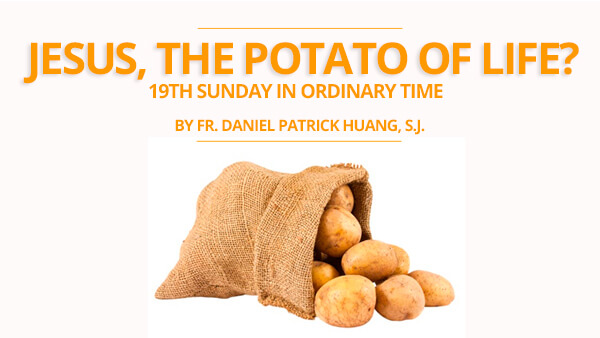


By Fr. Daniel Patrick Huang, S.J.
19th Sunday in Ordinary Time
August 9, 2015
“I am the living potato come down from heaven.” Timothy Radcliffe, the former General of the Dominicans, writes that one of his brothers (possibly an Irishman) found it hard to imagine that Jesus would ever say something like this. Here in Italy, where I live, would Jesus have said something like, “I am the living pasta come down from heaven”?
The shock and apparent irreverence of such statements might help us understand why the people of his time responded to Jesus as they did when he said, “I am the living bread come down from heaven.” We are so used to hearing Jesus referred to as the “bread of life,” that the metaphor no longer stuns and silences us, no longer challenges us to enter more deeply into the mystery of who we are and who God is. Perhaps we can let the strangeness of Jesus’ words strike us again. Jesus compares his divine identity (he uses the divine name “I am” from Exodus) to something as lowly, as ordinary, as necessary as food: bread. What might this mean for us?
When Jesus says “I am the bread of life,” he is responding to the “at sea” question of a humanity that is voraciously hungry and is unable to satisfy this cavernous emptiness. Almost forty years ago, the theologian Walter Burghardt wrote about the “seven hungers of humanity.” One need only read the newspapers or to see images on the internet—of refugees in Syria, of disaster victims in Nepal and Myanmar, of scavengers in Manila or prisoners in Bangkok–to confirm that these seven remain the unfulfilled longings of our world. We live in a world where people hunger for food, for meaning, for freedom, for peace, for understanding, for justice, for love. We live in a desperately hungry world, and the search for what will feed that hunger is not academic, but urgent, anguished, real.
In his encyclical Laudato Si, Pope Francis highlights how humanity today is foolishly trying to feed its hunger with what cannot really satisfy. “Compulsive consumerism” leads people to “get caught up in a whirlwind of needless buying and spending.” Our culture programs us to want the latest thing on the market; we are promised that this commodity will fulfill us; but it does not, and only leaves us wanting more. “The emptier a person’s heart is,” Pope Francis observes, “the more he or she needs things to buy, own, and consume.” (Laudato Si, Nos. 203-204) We are like silly people trying to slake our thirst with salt water, which only leaves us thirstier than before.
The point of bread is that it is to be eaten, consumed. Food disappears into the one who eats it, and becomes the eater’s strength, delight, growth, substance. So, Jesus is saying, it is with God. God knows our emptiness, and, with complete compassion and generosity, wants to empty himself into us, so that we might be full. Everything God is and has, God wants to give us. St. Ignatius, in the Spiritual Exercises, invites us to ponder “with deep affection how much God our Lord . . . has given me of what he possesses, and further . . . it is the Lord’s wish . . . to give me himself.” Because this is what love does: “the lover gives and communicates to the loved one what they have.”
Pope Francis beautifully describes this love of God in Christ, which responds to our deepest hunger: “We have a treasure of life and love which cannot deceive, and a message which cannot mislead or disappoint. It penetrates to the depths of our hearts, sustaining and ennobling us. It . . . reaches that part of us which nothing else can reach. Our infinite sadness can only be cured by an infinite love.” (Evangelii Gaudium, 265)
This is perhaps how God feeds this starving world: not from some distant heaven, but “outwards from the heart of being into the life of every day.” (Rowan Williams). People nourished deeply by the self-giving God move out into the world with God’s generosity and courage. “All around us,” Pope Francis happily notes, “we begin to see nurses with soul, teachers with soul, politicians with soul, people who have chosen deep down to be with others and for others.” Paradoxically, those who empty themselves find themselves full: “We do not live better when we flee, hide, refuse to share, stop giving and lock ourselves up in own comforts.” (Evangelii Gaudium, 272, 273)
What hungers in me and in the world am I most keenly aware of? How wisely or how foolishly do I seek to fill my emptiness? How might I respond more decisively to Jesus’ invitation to receive him as the bread of life for my life? How am I being called to nourish the hungers of others through the gift of myself?